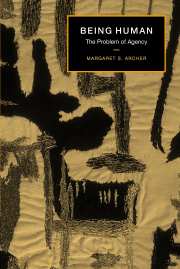Book contents
- Frontmatter
- Contents
- List of figures
- Acknowledgements
- Introduction
- Part I The impoverishment of humanity
- Part II The emergence of self-consciousness
- Part III The emergence of personal identity
- 6 Humanity and reality: emotions as commentaries on human concerns
- 7 Personal identity: the inner conversation and emotional elaboration
- Part IV The emergence of social identity
- Conclusion: the re-emergence of humanity
- Index
6 - Humanity and reality: emotions as commentaries on human concerns
Published online by Cambridge University Press: 22 September 2009
- Frontmatter
- Contents
- List of figures
- Acknowledgements
- Introduction
- Part I The impoverishment of humanity
- Part II The emergence of self-consciousness
- Part III The emergence of personal identity
- 6 Humanity and reality: emotions as commentaries on human concerns
- 7 Personal identity: the inner conversation and emotional elaboration
- Part IV The emergence of social identity
- Conclusion: the re-emergence of humanity
- Index
Summary
One of the major concerns of this book is with those properties of people which are intertwined with their sociality, yet are irreducible to it. These properties make for personal identity and their emergence is the subject of this chapter and the next. Introspectively, we are all constantly aware of the main property upon which this emergent process depends. As human beings we know that we live a rich inner life: that we are in continuous communion with ourselves and that we engage in a continual running commentary with the events going on around us. We are aware of how our inner lives monitor our responses to external situations in which we find ourselves and indeed modify some of the circumstances to which we willingly expose ourselves, be these natural, practical or social. For example, it is doubtful if there is a (normal) human being who is unaware of an internal dialogue which silently voices sentiments like, ‘Isn't he ever going to stop talking?’, ‘Careful, that truck's pulling out’, or, ‘I can't face that again.’ Moreover, we all also know that these are not just idle commentaries.
They are more than sotto voce asides as daily life goes by, passed by some unengaged spectator. Rather, the commentary is interwoven with our responses themselves: they are part of the action.
- Type
- Chapter
- Information
- Being HumanThe Problem of Agency, pp. 193 - 221Publisher: Cambridge University PressPrint publication year: 2000
- 2
- Cited by



